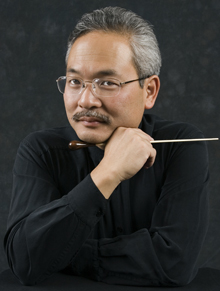Ralph Vaughan Williams A Sea Symphony
Happily, there are a good number of excellent recordings of all of Ralph Vaughan Williams symphonies. His first symphony, A Sea Symphony, was completed in 1909. A vast and majestic work of grand proportions, it is composed in the typical symphonic four movements and sets wonderful text by Walt Whitman.
Adrian Boult
For the strongest recordins in the catalog, one would logically turn to conductors from the UK, and in this instance the results are most pleasing. Sir Adrian Boult recorded this work twice, once in 1954 and again in 1968, both times with the London Philharmonic Orchestra and Choir. A champion of Vaughan Williams' music, Boult premiered RVW's third, fourth, and sixth sympohnies. His later recording of A Sea Symphony (EMI CDM 64016 2) is still one of the finest available. There is always a keen sense of large-scale shape and direction, and tempi are never overly sentimental. Both chorus and orchestra are excellent (except for the first exclamation of the word "sea" that doesn't quite tune will into the chord), as are the soloists Sheila Armstrong and John Carol Case. Particularaly lovely are the extended duet passages in the last movement. Though the sound is somewhat close, the overall effect is clean and powerful. Boult's earlier mono recording (London 425 658-2) is a wonderful reference point--the composer was present at the recording sessions. A young, and, perhaps, "hotter" reading.
Bryden Thomson
For an equally successful, though quite different experience, Bryden Thomson's recording (Chandos CHAN 8764) is a winner. Compelling and evocative, Thomson conducs a more expansive performance than Boult. Still, this is a reading that is never lacking in energy and excitement whwere needed. The London Symphony Orchestra and Chorus are in top form, and the choral singing is cleaner and more polished than in either of Boults's recordings. Baritone soloist Brian Rayner Cook is outstanding, with the right combination of heft and lyricism. Sonically, this is the finest of all available recordings — warm, rich, with exquisite detail and an almost uncanny depth to the soundstage. The opening of the first movement in this recording is truly audiophile demonstration stuff!
Andrew Davis
Fans of baritone Thomas Hampson can hear him on Teldec's offering (Teldec 4509-94550-2) conducted by Andrew Davis. With this recording the BBC Symphony Chorus and Orchestra, the third of the "Big Three" London choir and orchestra combinations, are given their chance to shine. With tempi that are slightly more brisk, this reading is full of energy and verve. One curious point is the recording itself that sounds at the same time close and somewhat woolly—perhaps made more apparent if one listens to this recording immediately following the previous Chandos disc.
André Previn
A young André Previn conducts a young RVW on RCA's recording (RCA 60580-2-RG). Lojng a strong recommendation in the catalog, this performance retains its freshness almost thirty years after it was recorded. Again, the London Symphony Orchestra and Chorus give an idiomatically spirited and colorful performance. Heather Harper and John Shirley-Quirk are simple and tender in their last movement pairing.
Other recordings
Other strong recordings include Vernon Handley conducting the Liverpool Philharmonic Orchestra and Chorus (Virgin VJ 759687-4), and Bernard Haitink conducting the London Philharmonic Choir and Orchestra (EMI CDC7 49911-2).

